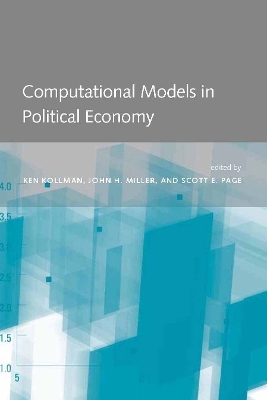
Computational Models in Political Economy
Seiten
2003
MIT Press (Verlag)
978-0-262-11275-8 (ISBN)
MIT Press (Verlag)
978-0-262-11275-8 (ISBN)
- Keine Verlagsinformationen verfügbar
- Artikel merken
The use of innovative computational models in political economic research as a complement to traditional analytical methodologies.
Researchers are increasingly turning to computational methods to study the dynamic properties of political and economic systems. Politicians, citizens, interest groups, and organizations interact in dynamic, complex environments, and the static models that are predominant in political economy are limited in capturing fundamental features of economic decision making in modern democracies. Computational models-numerical approximations of equilibria and dynamics that cannot be solved analytically-provide useful insight into the behavior of economic agents and the aggregate properties of political systems. They serve as a valuable complement to existing mathematical tools.This book offers some of the latest research on computational political economy. The focus is on theoretical models of traditional problems in the field. Each chapter presents an innovative model of interaction between economic agents. Topics include voting behavior, candidate position taking, special interest group contributions, macroeconomic policy making, and corporate decision making.
Researchers are increasingly turning to computational methods to study the dynamic properties of political and economic systems. Politicians, citizens, interest groups, and organizations interact in dynamic, complex environments, and the static models that are predominant in political economy are limited in capturing fundamental features of economic decision making in modern democracies. Computational models-numerical approximations of equilibria and dynamics that cannot be solved analytically-provide useful insight into the behavior of economic agents and the aggregate properties of political systems. They serve as a valuable complement to existing mathematical tools.This book offers some of the latest research on computational political economy. The focus is on theoretical models of traditional problems in the field. Each chapter presents an innovative model of interaction between economic agents. Topics include voting behavior, candidate position taking, special interest group contributions, macroeconomic policy making, and corporate decision making.
Ken Kollman is Associate Professor of Political Science and Senior Associate Research Scientist at the Center for Political Studies, ISR, at the University of Michigan. John H. Miller is Department Head and Professor of Social and Decision Sciences at Carnegie Mellon University. Scott E. Page is Associate Professor of Political Science, Complex Systems, and Economics at the University of Michigan.
| Reihe/Serie | Computational Models in Political Economy |
|---|---|
| Zusatzinfo | 62 illus. |
| Verlagsort | Cambridge, Mass. |
| Sprache | englisch |
| Maße | 152 x 229 mm |
| Gewicht | 544 g |
| Themenwelt | Informatik ► Grafik / Design ► Digitale Bildverarbeitung |
| Wirtschaft ► Volkswirtschaftslehre ► Wirtschaftspolitik | |
| ISBN-10 | 0-262-11275-2 / 0262112752 |
| ISBN-13 | 978-0-262-11275-8 / 9780262112758 |
| Zustand | Neuware |
| Haben Sie eine Frage zum Produkt? |
Mehr entdecken
aus dem Bereich
aus dem Bereich
Modelle für 3D-Druck und CNC entwerfen
Buch | Softcover (2022)
dpunkt (Verlag)
CHF 48,85
alles zum Drucken, Scannen, Modellieren
Buch | Softcover (2024)
Markt + Technik Verlag
CHF 34,90


